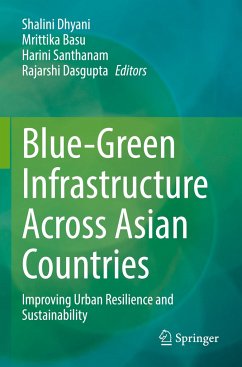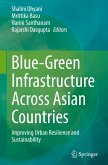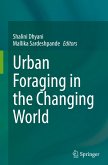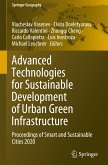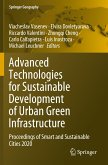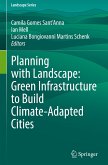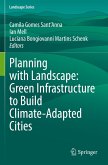Blue-Green Infrastructure Across Asian Countries
Improving Urban Resilience and Sustainability
Herausgegeben:Dhyani, Shalini; Basu, Mrittika; Santhanam, Harini; DasGupta, Rajarshi
Blue-Green Infrastructure Across Asian Countries
Improving Urban Resilience and Sustainability
Herausgegeben:Dhyani, Shalini; Basu, Mrittika; Santhanam, Harini; DasGupta, Rajarshi
- Broschiertes Buch
- Merkliste
- Auf die Merkliste
- Bewerten Bewerten
- Teilen
- Produkt teilen
- Produkterinnerung
- Produkterinnerung
This edited book discusses Blue-Green Infrastructure (BGI) from conception to implementation in building resilience and urban sustainability. The book emphasizes on infrastructures, institutions, and perceptions as three main pillars of implementing and managing successful BGI, with a special focus on Asia. The book highlights concepts as well as field-based experiences from different parts of Asia by experts, with a special focus on advances and opportunities in advancing BGI, challenges and constraints, followed by case studies on BGI mainstreaming. It addresses sustainable water management,…mehr
Andere Kunden interessierten sich auch für
![Blue-Green Infrastructure Across Asian Countries Blue-Green Infrastructure Across Asian Countries]() Blue-Green Infrastructure Across Asian Countries149,99 €
Blue-Green Infrastructure Across Asian Countries149,99 €![Urban Foraging in the Changing World Urban Foraging in the Changing World]() Urban Foraging in the Changing World149,99 €
Urban Foraging in the Changing World149,99 €![Advanced Technologies for Sustainable Development of Urban Green Infrastructure Advanced Technologies for Sustainable Development of Urban Green Infrastructure]() Advanced Technologies for Sustainable Development of Urban Green Infrastructure134,99 €
Advanced Technologies for Sustainable Development of Urban Green Infrastructure134,99 €![Advanced Technologies for Sustainable Development of Urban Green Infrastructure Advanced Technologies for Sustainable Development of Urban Green Infrastructure]() Advanced Technologies for Sustainable Development of Urban Green Infrastructure134,99 €
Advanced Technologies for Sustainable Development of Urban Green Infrastructure134,99 €![Planning with Landscape: Green Infrastructure to Build Climate-Adapted Cities Planning with Landscape: Green Infrastructure to Build Climate-Adapted Cities]() Planning with Landscape: Green Infrastructure to Build Climate-Adapted Cities119,99 €
Planning with Landscape: Green Infrastructure to Build Climate-Adapted Cities119,99 €![Planning with Landscape: Green Infrastructure to Build Climate-Adapted Cities Planning with Landscape: Green Infrastructure to Build Climate-Adapted Cities]() Planning with Landscape: Green Infrastructure to Build Climate-Adapted Cities119,99 €
Planning with Landscape: Green Infrastructure to Build Climate-Adapted Cities119,99 €![Transforming Biocities Transforming Biocities]() Transforming Biocities134,99 €
Transforming Biocities134,99 €-
-
-
This edited book discusses Blue-Green Infrastructure (BGI) from conception to implementation in building resilience and urban sustainability. The book emphasizes on infrastructures, institutions, and perceptions as three main pillars of implementing and managing successful BGI, with a special focus on Asia. The book highlights concepts as well as field-based experiences from different parts of Asia by experts, with a special focus on advances and opportunities in advancing BGI, challenges and constraints, followed by case studies on BGI mainstreaming. It addresses sustainable water management, multiscale environmental design, environmental risk assessment, and finally understanding policy implications and concerns for BGI mainstreaming in growing urban sprawls of the region. There has been growing global momentum and recognition of Blue-Green Infrastructure (BGI) as a multifunctional Nature-based Solution (NbS) with multiple co-benefits. There is strong evidence from many urban centres of Europe, USA, China, and South Africa demonstrating that mainstreaming BGI can help in addressing growing vulnerability of urban areas by ensuring safety, resilience, and sustainability for urban residents in the warming world. This book is a timely contribution for researchers, students, scholars, urban planners, consultants, and policy makers in the fields of environment, resilience, urban planning, climate adaptation, and sustainability science.
Produktdetails
- Produktdetails
- Verlag: Springer / Springer Nature Singapore / Springer, Berlin
- Artikelnr. des Verlages: 978-981-16-7130-2
- 1st edition 2022
- Seitenzahl: 540
- Erscheinungstermin: 26. März 2023
- Englisch
- Abmessung: 235mm x 155mm x 29mm
- Gewicht: 809g
- ISBN-13: 9789811671302
- ISBN-10: 9811671303
- Artikelnr.: 67513200
- Herstellerkennzeichnung Die Herstellerinformationen sind derzeit nicht verfügbar.
- Verlag: Springer / Springer Nature Singapore / Springer, Berlin
- Artikelnr. des Verlages: 978-981-16-7130-2
- 1st edition 2022
- Seitenzahl: 540
- Erscheinungstermin: 26. März 2023
- Englisch
- Abmessung: 235mm x 155mm x 29mm
- Gewicht: 809g
- ISBN-13: 9789811671302
- ISBN-10: 9811671303
- Artikelnr.: 67513200
- Herstellerkennzeichnung Die Herstellerinformationen sind derzeit nicht verfügbar.
Dr. Shalini Dhyani is Senior Scientist in Critical Zone Research Group of CSIR-National Environmental Engineering Research Institute (NEERI) India. She is South Asia Regional Chair for IUCN Commission on Ecosystems Management (CEM) and also serves as Lead author for Thematic Assessment on Sustainable Use of Wild Species by IPBES. She has extensively worked on the interlinkages between socio-ecological systems through sustainability science approaches. Her research interest is science-policy integration for better biodiversity and ecosystem-inclusive decision-making for disaster risk reduction, climate change adaptation, mitigation and sustainable development in natural and urban ecosystems. She has several peer reviewed publications to her credit. Dr Mrittika Basu is an Assistant Professor in the Graduate School of Global Environmental Studies, Kyoto University, Japan. Her research interests are in the field of ecosystem services, relational values, and the well-being of communities, particularly under the rapidly changing landscapes of Asia. Currently, she is working on multiple projects on nature connectedness and biophilia assessment among school children and urban residents in India and Japan. She has published several peer-reviewed scientific papers in internationally acclaimed journals and also served as a contributing author (CA) in the Intergovernmental Panel on Biodiversity and Ecosystem Services (IPBES) Global Assessment Report (2015-18). Dr. Harini Santhanam is an Assistant Professor with the National Institute of Advanced Studies, Bangalore, India, studying multiple aspects of aquatic systems such as biogeochemistry, hydrological processes, and land-water-human nexus. She has been a long-term researcher with IISc Bangalore, working in multi-disciplinary teams on analytical and ecosystem modelling techniques. Her research interests are multidisciplinary, bringing togetherinsights from aquatic biogeochemistry, ecosystem vulnerability, adaptability and resilience, with an emphasis on coastal and marine ecosystems. Her work also encompasses the use of novel environmental proxies and indices. Further, she investigates the challenges towards the sustainable development of aquatic systems by adopting nature-based solutions. Dr Rajarshi Dasgupta is a Senior Researcher at the Institute for Global Environmental Strategies, Kanagawa, Japan. He holds diverse research interests in the field of landscape ecology and planning, including Ecosystem-based Disaster Risk Reduction, development of socio-ecological scenarios, participatory conservation, and social forestry. He has worked extensively with communities in South and Southeast Asia, with major research experience in India, Japan, Myanmar, Bangladesh, Thailand and the Philippines. He also served as a lead author for IPBES Asia-Pacific Regional Assessment (2015-18), Sustainable Use of Wild Species Assessment (2018-21), and chapter scientist cum contributing author for IPCC's Sixth Assessment report.
Chapter 1. Mainstreaming Blue-Green Infrastructure for improving urban resilience and sustainability in the warming world.- Chapter 2. Regional trends in Social-Ecological Technological (SET) approaches to Sustainable Urban Planning: Focus on Asia.- Chapter 3. A Risk Assessment Approach to Urban Resilience .- Chapter 4. Promoting Blue Green Infrastructure in Urban Spaces through Citizen Science initiatives.- Chapter 5. Is Ensuring the Sustainable Implementation of BGI Possible? System Thinking of Urban Rivers as Social-Ecological Systems.- Chapter 6. Understanding Blue-Green Infrastructure through Spatial Maps: Contribution of Remote Sensing and GIS Technology.- Chapter 7. Cities and Biodiversity: Hidden Connections Between the Built Form and Life.- Chapter 8. Assessing ecological risks of urban air and water environment to analyse the scenarios for mainstreaming Nature-based Solutions: a case study of Bengaluru city, India.- Chapter 9. Do people appreciate economic value of water in Baku city of Azerbaijan?.- Chapter 10. Homegardens as sustainable urban agroforestry systems to promote household well-being in Kandy, Sri Lanka.- Chapter 11. Opportunities for Improving Urban Tree Cover - A Case Study in Kochi.- Chapter 12. Changing people-nature linkages around green infrastructure in rapidly urbanizing landscapes: the case of a protected area in Bengaluru Metropolitan Region of South India.- Chapter 13. Remodelling Urban Spaces in the Light of Blue-Green Infrastructure: A Case Study of Guwahati, India.- Chapter 14. Nature-based Solutions for the Restoration of the Abukuma River Ba-sin (Japan) after Typhoon Hagibis.- Chapter 15. Nature based solutions (NbS) for sustainable development of the resource-base and ecosystem services of marine and coastal ecosystems of India.- Chapter 16. Physical Vulnerability Assessment to Flooding of Residential Houses along the Coastal Areas in Sta. Rosa City, Laguna, Philippines.- Chapter 17. The significance of ancient water systems and the sacred groves in the landscape of Badami, Karnataka - A geospatial study.- Chapter 18. Urban Sustainability and Resilience building: Blue-Green infrastructure for air pollution abatement and realising multiple co-benefits.- Chapter 19. Disaster Risks and Resilience of Urban Bangladesh: Role of Blue Green Infrastructure.- Chapter 20. Endorsing City Biodiversity Index (CBI): Assessing Ecosystem Health in urban sprawls and Eco-DRR inclusive urban planning.- Chapter 21. Greenhouse Gas Mitigation by Integrating Waste Treatment System towards Low-Carbon City in Vietnam.- Chapter 22. The roles of non-governmental actors in facilitating urban blue-green infrastructures: A comparative review of the community initiatives in Taipei City, Taiwan.- Chapter 23. Mainstreaming blue-green infrastructure in policy and planning for urban resilience in the global south: promises and pitfalls.
Chapter 1. Mainstreaming Blue-Green Infrastructure for improving urban resilience and sustainability in the warming world.- Chapter 2. Regional trends in Social-Ecological Technological (SET) approaches to Sustainable Urban Planning: Focus on Asia.- Chapter 3. A Risk Assessment Approach to Urban Resilience .- Chapter 4. Promoting Blue Green Infrastructure in Urban Spaces through Citizen Science initiatives.- Chapter 5. Is Ensuring the Sustainable Implementation of BGI Possible? System Thinking of Urban Rivers as Social-Ecological Systems.- Chapter 6. Understanding Blue-Green Infrastructure through Spatial Maps: Contribution of Remote Sensing and GIS Technology.- Chapter 7. Cities and Biodiversity: Hidden Connections Between the Built Form and Life.- Chapter 8. Assessing ecological risks of urban air and water environment to analyse the scenarios for mainstreaming Nature-based Solutions: a case study of Bengaluru city, India.- Chapter 9. Do people appreciate economic value of water in Baku city of Azerbaijan?.- Chapter 10. Homegardens as sustainable urban agroforestry systems to promote household well-being in Kandy, Sri Lanka.- Chapter 11. Opportunities for Improving Urban Tree Cover - A Case Study in Kochi.- Chapter 12. Changing people-nature linkages around green infrastructure in rapidly urbanizing landscapes: the case of a protected area in Bengaluru Metropolitan Region of South India.- Chapter 13. Remodelling Urban Spaces in the Light of Blue-Green Infrastructure: A Case Study of Guwahati, India.- Chapter 14. Nature-based Solutions for the Restoration of the Abukuma River Ba-sin (Japan) after Typhoon Hagibis.- Chapter 15. Nature based solutions (NbS) for sustainable development of the resource-base and ecosystem services of marine and coastal ecosystems of India.- Chapter 16. Physical Vulnerability Assessment to Flooding of Residential Houses along the Coastal Areas in Sta. Rosa City, Laguna, Philippines.- Chapter 17. The significance of ancient water systems and the sacred groves in the landscape of Badami, Karnataka - A geospatial study.- Chapter 18. Urban Sustainability and Resilience building: Blue-Green infrastructure for air pollution abatement and realising multiple co-benefits.- Chapter 19. Disaster Risks and Resilience of Urban Bangladesh: Role of Blue Green Infrastructure.- Chapter 20. Endorsing City Biodiversity Index (CBI): Assessing Ecosystem Health in urban sprawls and Eco-DRR inclusive urban planning.- Chapter 21. Greenhouse Gas Mitigation by Integrating Waste Treatment System towards Low-Carbon City in Vietnam.- Chapter 22. The roles of non-governmental actors in facilitating urban blue-green infrastructures: A comparative review of the community initiatives in Taipei City, Taiwan.- Chapter 23. Mainstreaming blue-green infrastructure in policy and planning for urban resilience in the global south: promises and pitfalls.

